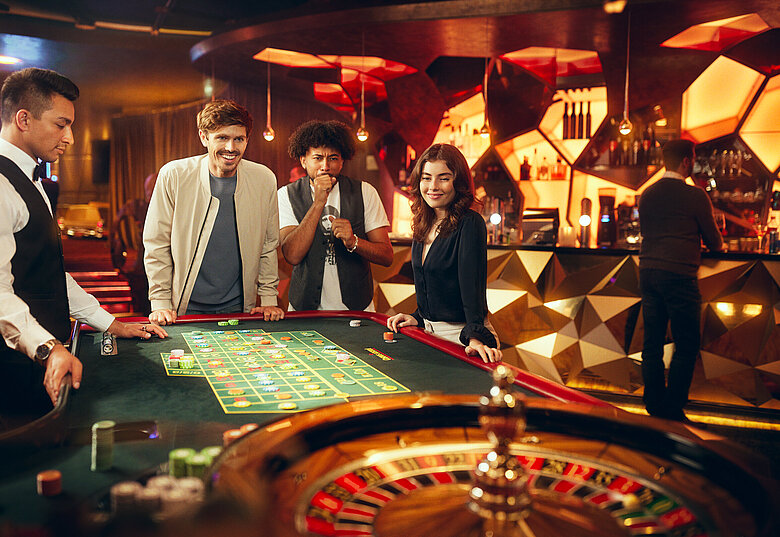
Casino games have long been a significant aspect of human culture, providing not just entertainment but a intriguing reflection of our aspirations, wishes, and concerns. From the turning reels of a slot machine to the strategic gameplay of poker, these games represent a variety of human sentiments and incidents. At their core, casino games are more than a chance to make profits; they are a snapshot of life itself, where risk versus reward intertwine and luck can change in an moment.
As players convene around tables or sit in front of glowing machines, they take part in a tradition that transcends mere betting. https://notyet.io/ These games reflect our instinctive desires for relationships, thrill, and the quest for chance. They also disclose deeper truths about human nature, such as our relationship with chance and the thrill of risk. In exploring casino games, we reveal not only the nuances of play but also the rich tapestry of the human journey, showcasing our woven narratives of hope and reality.
The Mind Behind Gambling
Gambling is intrinsically connected in human psychology, tapping into various emotions and desires. The thrill of taking risks is a fundamental aspect that draws players in, be it it’s excitement of spinning a roulette or the excitement of drawing a winning hand in a poker game. This adrenaline is often compared to other forms of thrill, as the unpredictability of outcomes triggers a unique psychological response. Gamblers often become entranced by the possibility of winning big, leading to an irresistible draw toward gambling games.
Another, an essential component of the psychology behind gambling is the concept of optimism and ambition. Participants often indulge in dreams of financial freedom and the opulent lifestyle that can accompany winning. This optimism fuels their continued participation in gambling, as it provides a sense of purpose and the conviction that a life-changing win could be just one wager away. The story of beating the odds and achieving success resonates with many, reinforcing their commitment to play and involve themselves with these games.
Finally, social dynamics play a significant role in gambling psychology. Gambling venues are designed to foster social interaction, where gamblers gather to share the journey of wins and losses. This shared aspect not only amplifies enjoyment but also affects behavior, as individuals often mimic the actions of others in their vicinity. The collective approval found in shared excitement can magnify the emotional experience, making casino games a mirror of not just personal desires but also collective engagement within the gambling community.
## The Dual Nature of Risk and Reward
Gambling activities embody the fragile balance between danger and gain that resonates profoundly with human nature. The thrill of placing a wager is often accompanied by a rush of adrenaline, as gamblers are confronted with the possibility of a huge payout, yet conscious of the risk to lose. This dual experience reflects a fundamental aspect of life: the choices we make often come with built-in risks, and the chase for gain can drive us to take chances we might not otherwise consider. In this way, casino games mirror real-world decisions, enticing players to risk not just their capital, but also their hopes.
The allure of jackpot prizes and winnings fuels a sense of optimism, motivating gamblers to dream of a brighter future that could arise from a fortunate turn of the roulette or dealing of a hand. This positive outlook can drive individuals to engage in riskier behaviors, pushing them to take greater risks in search of financial gain. However, just as in life, the results of these decisions can lead to both victory and loss. The narratives of both big winners and those who have faced losses everything at the tables demonstrate the random nature of luck and its consequential effect on our lives.
Ultimately, the experience of engaging with gambling activities serves as a vivid illustration of the human condition. Every game played is loaded with the tension of uncertainty, as gamblers weigh the gains against the dangers. This dynamic not only highlights the excitement that comes with gambling but also reveals the vulnerabilities that come with the longing for more. As we journey through the challenges of decision-making and consequence in both the gambling world and in life, we find that the search for benefit shapes our sense of self and experiences in deep ways.
Culture and Isolation in Casino Culture
Casino environment is a special mix of communal engagement and personal pursuit, reflecting the dualities of individual experience. Players often gather around games, sharing in the thrill of the game, celebrating wins, and sympathizing over losses. This social aspect is essential, as it establishes a sense of belonging and camaraderie among diverse groups of people. Regular visitors to casinos may form friendships and establish routines, turning the casino into a alternative home where they feel connected to a greater community of players.
However, the allure of gambling games can also result to isolation. As players become engrossed in the excitement of playing, they may withdraw from personal connections or fail to interact with the world outside the gaming space. For some, the search of a windfall can distract from genuine connections, leading to isolation. The experience of being surrounded people yet feeling solitary is not rare, as the attention shifts from collective fun to the private concerns of each player’s journey.
This interaction of community and isolation creates a rich tapestry that defines casino culture. It highlights the complexity of human interactions, where joy and despair exist together. Gambling venues serve as both a refuge for social interaction and a platform for individual struggles, demonstrating how intimately entwined our yearning for connection and the individual quest for fortune can be. In navigating this landscape, players confront their own stories—seeking both the rush of the game and the fellowship of fellow gamblers, eventually mirroring the broader spectrum of individual experience.
